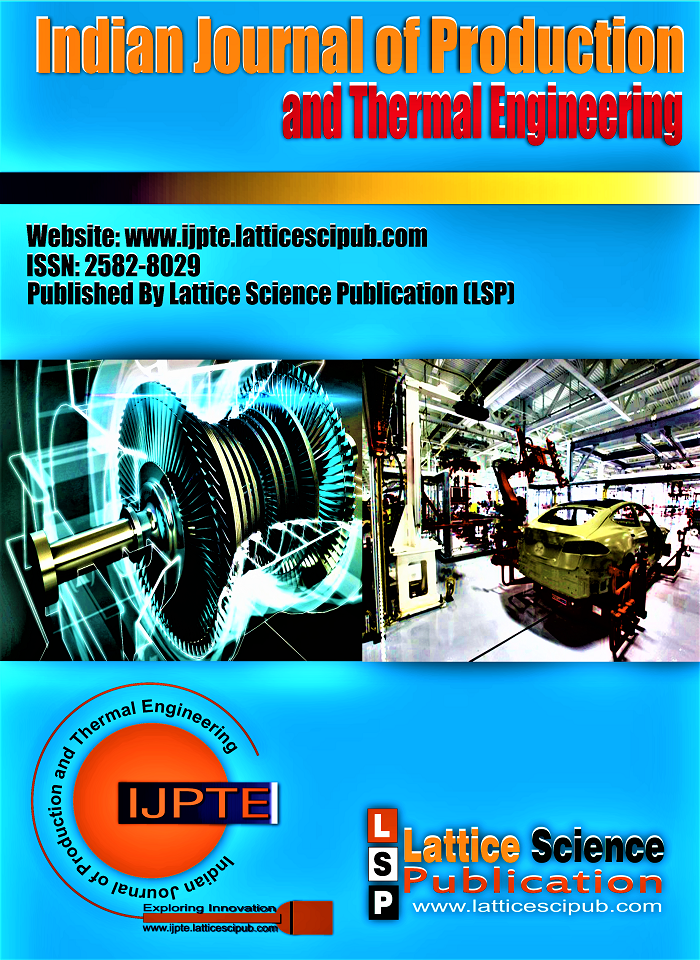Airflow Simulation in a Turbofan Engine: A Study of Flow Behavior
Main Article Content
Abstract
The efficient functioning of modern turbofan engines relies heavily on a deep understanding of airflow dynamics within critical components. This research paper presents a comprehensive investigation into airflow simulation within a turbofan engine, employing advanced computational techniques. The study focuses on flow behavior and makes use of SolidWorks for 3D modeling and ANSYS for simulation. The investigation centers on analyzing key flow parameters such as velocity, pressure, and temperature. The methodology involves creating an accurate 3D model of the turbofan engine excluding the compressor, combustion chamber, and turbine using SolidWorks to capture fine geometry and details. Subsequently, ANSYS is utilized to simulate the airflow within the turbofan engine, simulating realistic conditions and enabling the detailed analysis of flow behavior. The results of this study advance knowledge of turbofan engine technology and lay the groundwork for additional study and advancement in the area of aviation propulsion systems. In response to the evolving requirements of the aviation sector, the knowledge acquired from this research will serve as a priceless asset in the development of engines that are characterized by enhanced dependability, a reduced ecological footprint, and heightened fuel efficiency.
Downloads
Article Details

This work is licensed under a Creative Commons Attribution-NonCommercial-NoDerivatives 4.0 International License.
How to Cite
References
Liu, X. et al. “Development and progress in aeroacoustic noise reduction on turbofan aeroengines.” Progress in Aerospace Sciences 130, 100796 (2022). https://doi.org/10.1016/j.paerosci.2021.100796
Guimarães, T., Todd Lowe, K. & O’Brien, W. F. “Complex Flow Generation and Development in a Full-Scale Turbofan Inlet.” J Eng Gas Turbine Power 140, (2018). https://doi.org/10.1115/1.4039179
Gijare, O., Khaire, S., Bagwan, Mohd. Y., Srivastava, S., & Kulkarni, Prof. V. Productivity Optimization in a Shopping Complex using Industrial Engineering and Facility Layout Planning Tools. In International Journal of Management and Humanities, Vol. 4, Issue 8, pp. 35–39 (2020). https://doi.org/10.35940/ijmh.h0766.044820
Laskowski, G. M. et al. “Future Directions of High Fidelity CFD for Aerothermal Turbomachinery Analysis and Design.” in 46th AIAA Fluid Dynamics Conference (American Institute of Aeronautics and Astronautics, 2016). https://doi.org/10.2514/6.2016-3322
H. Z. Hassan, M. H. Gobran & A. Abd El-Azim. “3-D Flow Simulation through the Intake and Fan of Turbofan Engine at Take-Off Conditions.” International Review of Aerospace Engineering 6, 1–8 (2013).
Roberts, R. A. & Eastbourn, S. M. “Modeling Techniques for a Computational Efficient Dynamic Turbofan Engine Model.” International Journal of Aerospace Engineering 2014, 1–11 (2014). https://doi.org/10.1155/2014/283479
Rakesh, N. L., R, S., & Karthikeyan, S., Performance Analysis of Jet Engine of Aircraft. In International Journal of Engineering and Advanced Technology, Vol. 8, Issue 6s2, pp. 606–610 (2019). https://doi.org/10.35940/ijeat.f1179.0886s219
García Rosa, N., Dufour, G., Barènes, R. & Lavergne, G. “Experimental Analysis of the Global Performance and the Flow Through a High-Bypass Turbofan in Windmilling Conditions.” J Turbomach 137, (2015). https://doi.org/10.1115/1.4028647
Alam*, I. F., & Legowo, N., ERP Performance Measurement AT PT Hero Supermarket using the IT Balanced Scorecard Method. In International Journal of Recent Technology and Engineering (IJRTE), Vol. 8, Issue 4, pp. 8375–8379 (2019). https://doi.org/10.35940/ijrte.d9062.118419
Mark, C. P. & Selwyn, A. “Design and analysis of annular combustion chamber of a low bypass turbofan engine in a jet trainer aircraft.” Propulsion and Power Research 5, 97–107 (2016). https://doi.org/10.1016/j.jppr.2016.04.001
Qian, R., Li, B., Song, H., Dong, Q. & Wang, Y. “Aerodynamic Thermodynamic Modeling and Simulation of Turbofan Engine.” IOP Conf Ser Mater Sci Eng 685, 012024 (2019). https://doi.org/10.1088/1757-899X/685/1/012024
YANG, X., JIAN, M., DONG, W. & XU, Q. “Simulation of the secondary air system of turbofan engines: Insights from 1D-3D modeling.” Chinese Journal of Aeronautics 36, 231–245 (2023). https://doi.org/10.1016/j.cja.2022.06.018
Murtaza*, Dr. M. A., Aerodynamic Performance of Road Vehicles. In International Journal of Innovative Technology and Exploring Engineering, Vol. 9, Issue 6, pp. 642–645 (2020). https://doi.org/10.35940/ijitee.f3327.049620





